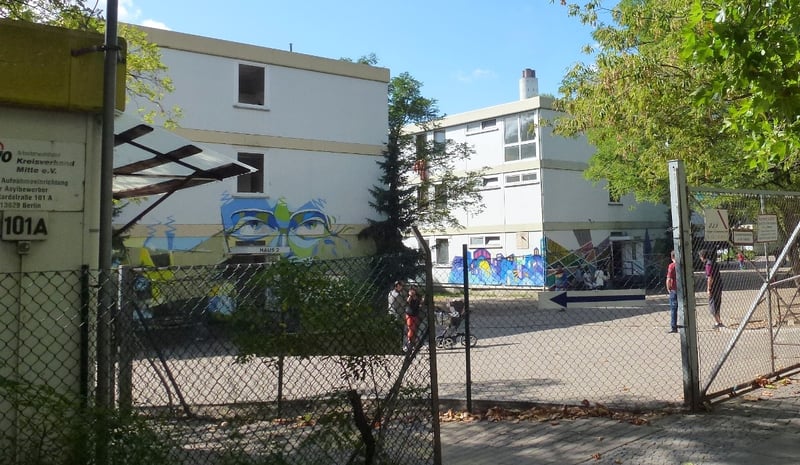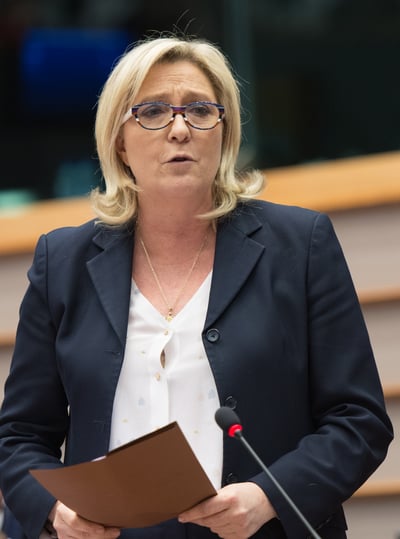Violent crime has increased in parts of Europe in the wake of mass immigration from the Middle East and Africa. Will the European backlash continue to grow?

Women protest outside Cologne Cathedral days after about 600 women were sexually assaulted on New Year’s Eve (Wikimedia Commons).
It was a watershed moment for Europe. A year ago on New Year’s Eve, up to a thousand migrant men assaulted about 600 German women in the center of Cologne, Germany.
The shocking and sordid affair initiated a hardening of attitudes toward Muslim migrants, forcing Europe to struggle with the prospect of having taken on a mass of people it cannot assimilate.
A clash of cultures
German officials and media clumsily attempted to cover it up initially, but the fiasco became an international scandal anyway. Public outrage followed, and hundreds of women filed charges.
The assaults provided the most lurid and distasteful example to date of the clash of cultures between the libertine but politically correct host societies and the overwhelmingly unattached young migrant men seeking refuge and prosperity in Europe without the civilizing influence of mothers, sisters or wives.
Importing more than just people
In the wake of the assaults, Cologne’s Mayor Henriette Reker feebly attempted to avoid blaming the assailants by releasing a code of conduct for women’s behavior in public that bordered on victim blaming. It included keeping strangers “an arm’s length away” and staying away from groups of people.
Several European countries are facing growing public unrest amid a rise in crime, including sexual assaults, prompting women’s rights groups in Germany to decry that a “culture of rape and violence” was endangering women in refugee centers.
Political expectations
European leaders have failed to fully confront the crime wave. There are accounts of political leaders instructing police to turn a blind eye to crimes perpetrated by migrants, apparently to avoid the appearance of Islamophobia or fueling anti-immigration sentiments. Information regarding migrant-related crimes has often been censored, with the nationality of perpetrators deemed not relevant or not given in the interests of “fair reporting.”
On Jan. 24, 2016, Die Welt reported that the suppression of data about migrant criminality is a “Germany-wide phenomenon.” According to Rainer Wendt, the head of the German police union, “Every police officer knows he has to meet a particular political expectation. It is better to keep quiet [about migrant crime] because you cannot go wrong.”
According to Germany’s Federal Criminal Police Office, migrants in Germany committed 142,500 crimes in just the first six months of 2016. This was the equivalent of 780 crimes a day—an increase of nearly 40 percent over 2015 (Daily Mail, Nov. 1, 2016).
Reported sexual violence in Germany has also increased, and up to 90 percent of the sex crimes committed don’t appear in the official statistics, according to André Schulz, the head of the Association of Criminal Police.
The growing backlash of public opinion
An Oct. 24, 2016, YouGov poll found that 68 percent of Germans believe that security has deteriorated dramatically recently and that they fear for their lives and property in German train stations and subways.
Research by the Friedrich Ebert Foundation, which is associated with the center-left Social Democratic Party, found that one in three Germans feel they are “strangers in their own country” due to “Muslim infiltration,” and nearly half of Germans fear their country is being “subverted by Islam.”
Immigration without assimilation
Refugee housing in Germany.
Many of Europe’s Muslims, far more religious than the average European, have not integrated well into their respective host societies. Many refuse to assimilate at all, preferring areas where they can work, shop, play and engage in social activities without speaking a word of the local language.
A sensational 2016 dossier released by the anti-immigrant Hungarian government claims there are more than 900 “no-go” zones throughout Europe where police have lost control. Typically these are Muslim enclaves fringing otherwise prosperous cities like Paris, Brussels, Stockholm and Berlin.
Not an economic miracle for all
Starting in 1955, Germany encouraged an inflow of unskilled laborers, initially from Turkey, who helped produce the Wirtschaftswunder, or economic miracle, which elevated the country to top-tier economic status. For many years—long before the current refugee crisis—Germany was the European country most open to immigration.
According to Eurostat, from 2005 to 2014 Germany welcomed more than 6 million immigrants, many from countries hostile to Western culture.
But low-skill jobs with decent wages are waning throughout the West, and migrants are the least prepared for the job market. Less than one-quarter of Iraqis come with completed vocational training. Munich economist Ludger Wössmann notes that two-thirds of young Syrians are “functional illiterates by international standards.” Tino Sanandaji of the Stockholm Business School told the Frankfurter Allgemeine Zeitung that “it takes an average of seven years before a refugee gets a steady job.”
Hence, a recent survey of refugees’ employment status, educational background and values tabulated that only about one in eight have found jobs so far (Federal Office for Migration and Refugees and the IAB and DIW research institutes).
Is a “German Islam” the answer?
Despite a Reuters report detailing how mosques in Germany are more conservative than those in Syria, Germany’s Finance Minister Wolfgang Schäuble penned an opinion article calling for the development of a “German Islam” with “a free, open, pluralistic and tolerant order, according to our laws and the religious neutrality of the state” (Welt am Sonntag). “There is no doubt,” acknowledged Schäuble, “that the growing number of Muslims in our country today is testing the tolerance of mainstream society.”
Despite those cultural impediments, outgoing German President Joachim Gauck surprised many when he stated his belief that Germany will eventually have a Muslim president.
How did the face of Europe change so rapidly?
In little more than one generation, Europe has changed from population exporter to importer, and in another generation it may be unrecognizable.
German Chancellor Angela Merkel is heading toward 2017’s national elections more politically vulnerable than ever, even as the right-wing populist party Alternative for Germany, which advocates the incompatibility of Islam with the German constitution, has gained ground.
One reason for the drastic change is that Europeans got old and stopped having babies. Eastern Europe now has the largest population loss in modern history, and Germany overtook Japan in the race for the world’s lowest birth rate. According to population projections made by Eurostat in 2013, without the influx of migrants, Europe’s population would plunge from 507 million in 2015 to 399 million by 2080. In the same time span Germany’s 80 million would shrink to 50 million. Spain and Italy also show precipitous drops.
To replace its workers and still maintain the social welfare state, Europe chose, in essence, to borrow a low-wage population from Turkey, Northern Africa, sub-Saharan Africa and the Middle East. These migrants bring cultures with radically different values.
Anger and populism influencing elections
German Chancellor Angela Merkel’s continued justification of her decision to admit 2 million more migrants to Germany has left her increasingly isolated from other leaders coping with the fallout of anti-immigrant, anti-Muslim sentiment in their electorates. Mrs. Merkel is heading toward 2017’s national elections more politically vulnerable than ever, even as the right-wing populist party Alternative for Germany, which advocates the incompatibility of Islam with the German constitution, has gained ground.
“Without any action the migratory influx will be like the barbarian invasion of the fourth century, and the consequences will be the same”
—Marine Le Pen.
Times of tension and crisis
Peace depends on prosperity, and as the consequences of Europe’s open borders bring additional costs, pain and instability, many “politically correct” sentiments may dissolve as Europeans desire security above all else.
Bible prophecies have long foretold that a southern kingdom will push against or attack a kingdom to the north. This will prompt a swift and fierce response by the “king of the North,” a coming European superpower, described as a combination of iron and clay—partly strong and partly weak (Daniel 11:40; 2:31-45).
Times of tension and crisis—like those Europe is currently experiencing with the ongoing migrant predicament—will challenge the odd iron-and-clay mixture and may prompt a populist cry for a strong hand to resolve the existential threat.
Learn more about the future for Europe and the world in our free booklet The Book of Revelation: The Storm Before the Calm.




